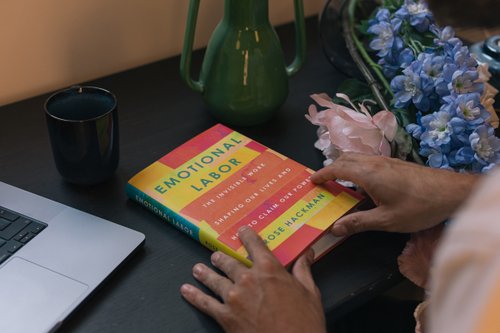The Four Toltec Agreements: Deal with the world calmly, even at work
Jan 06, 2022
4 mins

AG
Everyone tries to deal with the world as calmly as they can, but you have to admit, it’s not always that easy. In his life-changing book, The Four Agreements, Don Miguel Ruiz deconstructs those beliefs that hamper you from feeling happy and loved, and that create unnecessary suffering. How do you free yourself from the conditioning society has locked you into so you can regain your freedom and achieve your full potential? In his book, Miguel Ruiz has used the teachings of Mexican shamans to come up with a virtuous code of conduct, full of common sense, yet also powerful, which has taken the form of four major agreements you should make with yourself.
“You need a very strong will in order to adopt the four agreements – but if you can begin to live your life with these agreements, the transformation in your life will be amazing. You will see the drama of hell disappear right before your very eyes. Instead of living in a dream of hell, you will be creating a new dream – your personal dream of heaven.”
1st agreement: Be Impeccable With Your Word
To respect the first agreement, you have to become aware of the performative aspect of speaking and how harmful it is to say negative things or to gossip. “I know, I’m really bad at public speaking”, “I’ve always been told I’m not cut out for managing a team”, “I feel like my boss thinks I’m not as creative as the others”, “That intern works really slowly!” What you say, even just to yourself, has power whether it’s about yourself or someone else. Don Miguel Ruiz recommends not judging or criticizing yourself for anything. To “be impeccable” means not doing anything that will harm yourself, but making good use of your own energy instead. It means using your words appropriately in order to free yourself from your daily hell and the limits that you place on yourself.
“Looking at everyday human interactions, imagine how many times we cast spells on each other with our word. Over time this interaction has become the worst form of black magic, and we call it gossip.”
Applying it to your professional life
Don’t let your inner voice bully you or make you doubt your skills: yes, you are totally capable of taking on of such and such a project; yes, you can start a business and follow through with your ideas if you apply yourself; no, it is not too late to learn and acquire new skills, whatever your age.
Don’t bad-mouth anyone in the workplace as it can quickly have a negative impact on your coworkers and your work.
Don’t take other people’s opinion of you too seriously, even if they seem at odds with your own.
2nd agreement: Whatever Happens, Don’t Take Anything Personally
The author explains in his book that if you take other people’s negative words about you seriously, you’re giving them the permission to continue. You have to understand that you’re not responsible for what other people think, say, or do. Don Miguel Ruiz insists that even when you’ve been insulted, it has nothing to do with you. People share the opinions that they have decided in their own minds. Don’t accept other people’s poison. The author recommends that you become immune to the opinions of others: you don’t have to justify yourself to them, and above all, don’t get involved in conflicts that will cost you energy in order to defend your beliefs.
“All people live in their own dream, in their own mind; they are in a completely different world from the one we live in. When we take something personally, we make the assumption that they know what is in our world, and we try to impose our world on their world.”
Applying it to your professional life
Don’t mope after a heated exchange with a coworker, whether it’s a disagreement over a project, or after a meeting that went badly.
Don’t hold grudges and don’t take your problems home after work: you have no reason to feel personally attacked, no matter what the circumstances within your professional arena.
3rd agreement: Don’t Make Assumptions
Don Miguel Ruiz has noticed that we often make assumptions about what others think or do. We attribute intentions, but we might have misinterpreted them. You then start to think your assumptions are true. Making assumptions is the best way to create problems for yourself and to take things too personally. The author suggests getting clarification with every kind of communication: when you don’t know or you don’t understand, ask questions. Once you know the truth, there is no need to make assumptions and no room for misinterpretation, which leads back to agreement number one, being impeccable with your word.
“We make the assumption that everyone sees life the way we do. We assume that others think the way we think, feel the way we feel, judge the way we judge and abuse the way we abuse. And this is why we have a fear of being ourselves around others. Because we think everyone else will judge us, victimize us, abuse us and blame us as we do ourselves.”
Applying it to your professional life
Don’t assume your superiors know your intentions, that they’re aware that you’re dreaming of a promotion or switching jobs.
Say what’s on your mind, express yourself, and ask the right questions to better understand.
Make sure your communication is smooth with your coworkers or your team.
Don’t lie to yourself about what you truly want, without either underestimating or overestimating yourself.
Don’t over-interpret the attitudes of others.
4th agreement: Always Do Your Best
The objective of this fourth agreement is to turn the other three into firmly established habits. Whatever the circumstances, the book recommends always doing your best, no more, no less. Doing more than your best means wasting energy for an unsatisfying result, while doing less than the best you are capable of means dealing with frustration, feeling guilty, and feeling regret. Your mood, your physical condition, or your level of fatigue may change, but if you do your best despite everything, you will spare yourself the shame and self-punishment of not having done a good job.
“A good example of this comes from the story about Forrest Gump. He didn’t have great ideas, but he took action. He was happy because he always did his best at whatever he did. He was richly rewarded without expecting any reward at all.”
Applying it to your professional life
Always give yourself the means to work in the best conditions, both physically and mentally.
Take advantage of the times when you are most effective to get as much done as possible and to be productive. Conversely, do not judge or criticize yourself during periods where you’re less productive.
Be kind to yourself, to others, and about other people’s accomplishments.
Push yourself every day to follow the first three agreements, to better have a calm working environment.
Translated by Kalin Linsberg
Photo by Welcome to the Jungle
Follow Welcome to the Jungle on Facebook on LinkedIn and on Instagram and subscribe to our newsletter to get our latest articles every day!

More inspiration: Mental health

‘We need each other’: Monika Jiang on combating loneliness in hybrid work
Hybrid work offers flexibility but can leave us feeling disconnected. Monika Jiang explores how we can rebuild workplace connections.
Dec 19, 2024

Struggling at work? Here are 3 steps to rebuilding your self-esteem
Low on confidence? Learn how reflection, recharging, and refocusing can help you rebuild self-esteem and thrive professionally.
Nov 27, 2024

10 ways to beat the Sunday Scaries
Even people who love their jobs can experience the Sunday Scaries. Psychologist Karen Doll offers several strategies to help manage and overcome it.
Sep 12, 2024

Unpacking the burden of emotional labor
Rose Hackman’s "Emotional Labor" reveals how managing emotions impacts everyone, especially women and minorities.
Aug 08, 2024

Is financial anxiety harming your productivity?
Feeling overwhelmed by financial anxiety? You're not alone. Discover practical steps and expert advice to regain control of your work-life balance.
Jul 31, 2024
The newsletter that does the job
Want to keep up with the latest articles? Twice a week you can receive stories, jobs, and tips in your inbox.

Looking for your next job?
Over 200,000 people have found a job with Welcome to the Jungle.
Explore jobs